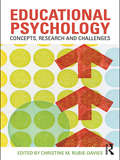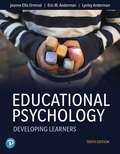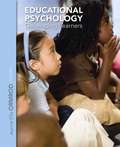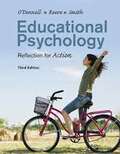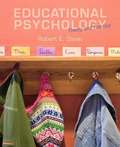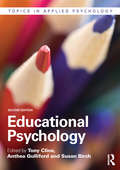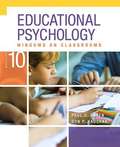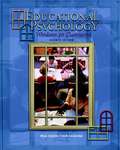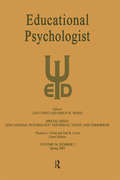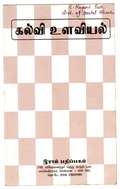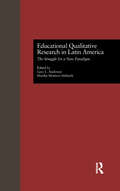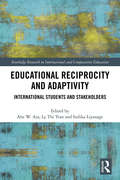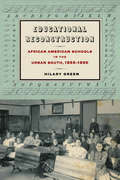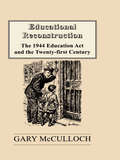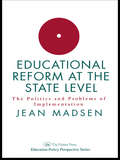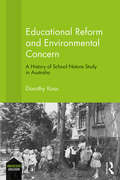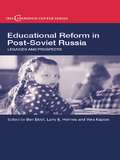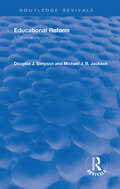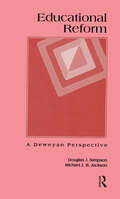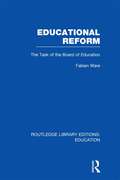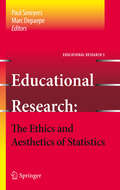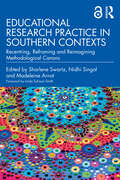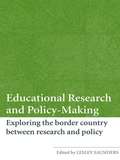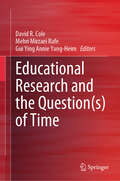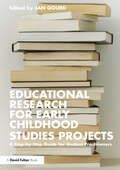- Table View
- List View
Educational Psychology: Concepts, Research and Challenges
by Christine M. Rubie-DaviesResearch in educational psychology has had a huge impact in terms of enhancing understanding and challenging thinking about teachers and learners. Educational Psychology: Concepts, Research and Challenges brings together the latest research across many areas of educational psychology, introducing and reporting on the most effective methodologies for studying teachers and learners and providing overviews of current debates within the field. With chapters from international authors, this academic text reveals theoretical overviews and research findings from across the field including: teaching and learning research methods motivation and instruction curriculum – reading, writing, mathematics cognition special educational needs and behaviour management sociocultural and socioemotional perspectives assessment and evaluation. Educational psychology has historically had a focus on students with particular learning needs. This book provides a discussion about the gradual movement toward inclusion and the possibility of developing a more cohesive and potentially more effective education system for all students. It also provides recent research into effective behaviour management and presents specific and valuable techniques employed in applied behaviour analysis. The contributors also deliver analysis on the motivation of students and how home and society in general can contribute towards constraining or enhancing student learning. This book is a must-read for academics, researchers, undergraduate and graduate students who recognize the substantial contribution of educational psychology to increasing our understanding of students and their learning, teachers and their teaching.
Educational Psychology: Developing Learners
by Jeanne Ormrod Eric Anderman Lynley AndermanHelp students understand their own learning and apply the core concepts and principles of educational psychology Educational Psychology: Developing Learners is known for its exceptionally clear and engaging writing, its in-depth focus on learning, and its extensive concrete applications. The text's unique approach moves seamlessly between theory and application, helping students understand concepts by examining their own learning and then showing them how to apply these concepts as teachers. The 10th Edition reflects the most current research on learning, development, motivation, and assessment. It features extensive and integrated coverage of diversity, technology, contexts of learning, and neuropsychology. In addition, compelling application-based examples and authentic artifacts are included throughout the book to help readers connect educational psychology to real children and classrooms.
Educational Psychology: Developing Learners (Eighth Edition)
by Jeanne Ellis OrmrodEducational Psychology: Developing Learners is known for its exceptionally clear and engaging writing, its in-depth focus on learning, and its extensive concrete applications. Its unique approach helps students understand concepts by examining their own learning and then showing them how to apply these concepts as teachers. More than any other educational psychology text, this text moves seamlessly between theory and applications, features the most extensive and integrated coverage of diversity, contexts of learning, neuropsychology and brain development, and classroom applications of technology. It includes innumerable concrete examples to help readers connect educational psychology to real children and classrooms. From reviews of the book: "Rather than simply presenting the necessary content, the author makes you feel like she is talking directly to you. . . . I love that diversity that has been woven throughout the fabric of this text. . . . Ormrod's personalized writing style will reach undergraduate students in a way that few authors can. [The book] is concise, yet thorough; comprehensive, yet unpretentious. " --Angela Bloomquist, California University of Pennsylvania 'Compared to other texts, Ormrod's text is written in a more accessible way. . . . Strengths [include] accessibility, good use of supplementary materials, [and] updated research. " --David Yun Dai, University at Albany, SUNY "Love how each chapter discusses diversity and special needs! . . . Most students keep this text throughout their teaching careers as a resource. Of all the educational psychology textbooks that I've used, this one is the most comprehensive and interactive with vivid examples. . . . The supplemental materials are very useful. The power point is extensive and easy to use for lecture. I use the test bank materials and find the questions to be aligned with students' licensure exams. " --Cindy Ballantyne, Northern Arizona University Note: MyEducationLab does not come automatically packaged with this text. To purchase MyEducationLab, please visit: www. myeducationlab. com or you can purchase a valuepack of the physical text + MyEducationLab.
Educational Psychology: Reflection for Action
by Jeffrey K. Smith Angela M. O'Donnell Johnmarshall ReeveTeachers help students learn, develop, and realize their potential. To become successful in their craft, teachers need to learn how to establish high-quality relationships with their students, and they need to learn how to implement instructional strategies that promote students' learning, development, and potential. To prepare pre-service teachers for the profession, the study of educational psychology can help them to better understand their students and better understand their process of teaching. Such is the twofold purpose of Educational Psychology – to help pre-service teachers understand their future students better and to help them understand all aspects of the teaching-learning situation. The pursuit of these two purposes leads to the ultimate goal of this text – namely, to help pre-service teachers become increasingly able to promote student learning, development, and potential when it becomes their turn to step into the classroom and take full-time responsibility for their own classes.
Educational Psychology: Theory and Practice
by Robert E. SlavinEducational Psychology: Theory and Practice gives tomorrow's teachers the intellectual grounding and practical strategies they need to be effective instructors. Complete, up-to-date information is presented in readable, practical ways and illustrated with engaging examples, case studies, and embedded videos and interactive activities. The text makes the connection between theory and practice explicit, helping students to transfer what they learn to their own teaching.
Educational Psychology: Topics In Applied Psychology (Topics in Applied Psychology)
by Tony Cline Anthea Gulliford Susan BirchEducational Psychology, Second Edition offers a comprehensive overview of how key advances in social, developmental and cognitive psychology impact upon the role of educational psychologists working today. Written by leading researchers, the book also explores controversies and dilemmas in both research and practice, providing students with a balanced and cutting-edge introduction to both the field and the profession. Fully revised throughout, the new edition is written to encourage students to integrate their understanding of core psychological disciplines, as well as to consider what ‘evidence-based practice’ really means. Organized into two broad sections related to learning and behaviour, the book features a selection of vignettes from educational psychologists working in a range of contexts, as well as tasks and scenarios to support a problem-orientated approach to study. By integrating both research and everyday practice, the book is unique in engaging a critical appreciation of both the possibilities and limitations of educational psychology. It is the ideal book for any student wishing to engage with this important and evolving field of study.
Educational Psychology: Windows On Classrooms (Tenth Edition)
by Don Kauchak Paul EggenThis significantly revised Tenth Edition focuses on applying theories and research in educational psychology to an educator’s work in the classroom. The content has been updated to reflect the most current research and trends in the field and in K-12 classrooms, yet care has been taken to preserve the essential applied nature of this text. Using an integrated-case approach, authors Eggen and Kauchak begin each chapter with a case study taken from actual classroom practice, and then weave the case throughout the chapter, extracting specific illustrations and, in some instances, using dialogue directly from the case to emphasize the application of chapter content to the classroom setting. Many additional concrete examples taken from both classrooms and daily living further illustrate the content of each chapter in a comprehensive and approachable manner.
Educational Psychology: Windows on Classrooms, 7th Edition
by Paul D. Eggen Donald P. KauchakFor courses in Introduction to Educational Psychology. Long recognized as very applied and practical, Eggen and Kauchak's Educational Psychology: Windows on Classrooms, seventh edition is now even more applied and concise, giving students exactly what they need to know in the course. The author's hallmark cases remain, in both written and videotape format, to introduce real-world applications in a way that no other text can. Along with expanded applications to diversity (urban, suburban, and rural areas), technology, and a new pedagogical system that completely restructures how information is delivered in the book and will help students really understand what they should be getting out of every single chapter. Educational Psychology: Windows on Classrooms once again truly fulfills the promise of its title, giving students a "window" on the classrooms in which they will someday teach.
Educational Psychology: Yesterday, Today, and Tomorrow: A Special Issue of Educational Psychologist
by Lyn Corno Philip H. WinneFirst published in 2001. Routledge is an imprint of Taylor & Francis, an informa company.
Educational Psychology: கல்வி உளவியல்
by K. Thiagarajanஇந்நூல் இந்தியப் பல்கலைக் கழகங்களின் பி எட், எம்.எட் பட்ட வகுப்புகளுக்கான பாடதிட்டத்தை கவனத்தில் கொண்டு உருவாக்கப்பட்டுள்ளது. இந்நூலில் காணப்படும் உளவியல் கருத்துகளும், கோட்பாடுகளும் ஏற்கனவே நடைமுறையில் இருந்தாலும் அவற்றை விளக்க கையாளப்பட்டிருக்கும் எடுத்துக் காட்டுகள், நம்நாட்டுச் சூழலில் ஒவ்வொரு மாணவரும் சந்தித்திருக்கக் கூடிய அன்றாட வாழ்க்கை அனுபவங்களை ஒட்டி அமைந்தவை என்பது இந்நூலின் சிறப்பு.
Educational Qualitative Research in Latin America: The Struggle for a New Paradigm (Studies in Education and Culture #11)
by Gary L. Anderson Martha Montero-SieburthFirst Published in 1998. Routledge is an imprint of Taylor & Francis, an informa company.
Educational Reciprocity and Adaptivity: International Students and Stakeholders (Routledge Research in International and Comparative Education)
by Ly Thi Tran Indika Liyanage Abe W. AtaEducational Reciprocity and Adaptability challenges the common belief that adapting to new educational settings is the responsibility of international students alone. The book argues that reciprocal responses are required by students and stakeholders alike for an efficient and equitable accommodation of international students in educational settings. Considering how international students negotiate academic challenges and social tensions, it presents both theoretical frameworks and practical tools to work around the tension regarding ethical academic practices. Crucially exploring these issues across a range of geographical and institutional contexts, and therefore offering critical insights into significant developments in international education across the world, the much-needed research in this edited collection explores: institutional educational policies regarding international students and stakeholders; institutional practices and how they are received; educational adaptability and responses from different stakeholders; the experiences of international students and institutions in negotiating academic and social tensions. This important contribution to research on the experiences of international students in different geographical and educational contexts is of great interest to academics, researchers and postgraduate students in the fields of international education, comparative education, sociology of education, youth studies, intercultural studies, migration studies and TESOL.
Educational Reconstruction: African American Schools in the Urban South, 1865-1890 (Reconstructing America)
by Hilary N. GreenTracing the first two decades of state-funded African American schools, Educational Reconstruction addresses the ways in which black Richmonders, black Mobilians, and their white allies created, developed, and sustained a system of African American schools following the Civil War.Hilary Green proposes a new chronology in understanding postwar African American education, examining how urban African Americans demanded quality public schools from their new city and state partners. Revealing the significant gains made after the departure of the Freedmen’s Bureau, this study reevaluates African American higher education in terms of developing a cadre of public school educator-activists and highlights the centrality of urban African American protest in shaping educational decisions and policies in their respective cities and states.
Educational Reconstruction: The 1944 Education Act and the Twenty-first Century
by Gary McCullochThis book presents a clear overview of the debates that surrounded the making of the 1944 Act, which affected every aspect of education in this country. It gives a detailed account of the tripartite divisions into 'three types of child' that were sanctioned in the reforms of the 1940s. At the same time, it also emphasises the idea of education as a civic project which underlay the reforms and which was such an important part of their lasting authority. The education policies of the past decade and the current attempts to shape a new education settlement need to be interpreted in a long-term historical framework and in particular, in relation to the aims and problems of the last great cycle of reform in the 1940s. This book makes an important contribution to the development of such a framework and the social history of education policy in this country.
Educational Reform At The State Level: The Politics And Problems Of Implementation (Education Policy Perspectives Ser.)
by Jean MadsenThis book sets out to describe the personal experiences of a state worker in Missouri as she attempted to implement educational reform programmes in the late 1980's. This was a critical time in America as other states were mandating new regulations to improve the quality of schools. Problems emerged such as lack of resources, bureaucratic red tape, and a dysfunctional administrative structure caused chaos, hampering the ability of the state workers to regulate and administer the new programmes. Some of the superintendents who did not believe in the new programmes resisted by abusing state funds and witholding information so teachers could not participate. This is a timely case study as legislators play a more important role in developing schools and the state will become the responsible agency to implement reform. Madsen's experience verifies the policy implementation literature and cites several new theoretical perspectives on the important role of the state agency in determining the success or failure of mandated reform programmes. The study indicates the need for state agencies to change their perspectives from regulation to service orientation if reform programmes are to succeed in schools.
Educational Reform and Environmental Concern: A History of School Nature Study in Australia (Progressive Education)
by Dorothy KassA crucial component of the New Education reform movement, nature study was introduced to elementary schools throughout the English-speaking world in the late nineteenth and early twentieth centuries. Despite the undoubted enthusiasm with which educators regarded nature study, and the ambitious aims envisioned for teaching it, little scholarly attention has been paid to the subject and the legacy that nature study bequeathed to later curricular developments. Educational Reform and Environmental Concern explores the theories that supported nature study, as well as its definitions, aims, how it was introduced to curricula and its practice in the classroom, by focusing upon educational reform in the Australian state of New South Wales. This book explores nature study within the context of broader educational reform movements in a period characterised by a transnational exchange of ideas. It is the only book on nature study available to date that focuses on the history of the movement outside the USA, providing a much-needed alternative perspective. Kass considers nature study as it adapted and changed throughout the twentieth century, addressing the extent to which the nature study idea represented, responded to and even influenced concern about the natural environment. Educational Reform and Environmental Concern will appeal to researchers, academics and postgraduate students engaged in the study of educational and environmental history. Researchers with an interest in a transnational or imperial approach to the history of education will also benefit from the wealth of comparative material that Kass presents.
Educational Reform in Post-Soviet Russia: Legacies and Prospects (Cummings Center Series #Vol. 20)
by Vera Kaplan Ben Eklof Larry E. HolmesThis volume consists of a collection of essays devoted to study of the most recent educational reform in Russia. In his first decree Boris Yeltsin proclaimed education a top priority of state policy. Yet the economic decline which accompanied the collapse of the Soviet Union dealt a crippling blow to reformist aspirations, and to the existing school system itself. The public lost faith in school reform and by the mid-1990s a reaction had set in. Nevertheless, large-scale changes have been effected in finance, structure, governance and curricula. At the same time, there has been a renewed and widespread appreciation for the positive aspects of the Soviet legacy in schooling.The essays presented here compare current educational reform to reforms of the past, analyze it in a broader cultural, political and social context, and study the shifts that have occurred at the different levels of schooling 'from political decision-making and changes in school administration to the rewriting textbooks and teachers' everyday problems. The authors are both Russian educators, who have played a leading role in implementation of the reform, and Western scholars, who have been studying it from its very early stages. Together, they formulate an intricate but cohesive picture, which is in keeping with the complex nature of the reform itself.Contributors: Kara Brown, (Indiana University) * Ben Eklof (Indiana University) * Isak D. Froumin, (World Bank, Moscow) * Larry E. Holmes (University of South Alabama) * Igor Ionov, (Russian History Institute of the Russian Academy of Sciences) * Viacheslav Karpov & Elena Lisovskaya, (Western Michigan University) * Vera Kaplan, (Tel Aviv University) * Stephen T. Kerr, (University of Washington) * James Muckle, (University of Nottingham) * Nadya Peterson, (Hunter College) * Scott Seregny, (Indiana University-Purdue University Indianapolis) * Alexander Shevyrev, (Moscow State University) * Janet G. Vaillant, (Harvard University)
Educational Reform: A Deweyan Perspective (Critical Education Practice Ser.)
by Douglas J. Simpson Michael J. JacksonFirst published in 1997. This book illuminates contemporary educational reform discussions regarding teacher education programs and pre-K-12 schools by providing a clear analysis and application of John Dewey's relevant educational writings and ideas. The volume addresses issues of how future teachers should be liberally educated as well as prepared to be professional educators. Pre-K-12 education is evaluated through a Deweyan lens, involving a discussion of such topics as the teacher's responsibilities, charter schools, a common curriculum, professional development schools, new curricula, school administration, and cooperative learning. In the concluding chapter, the authors point out many of the questions and concerns that those who are interested in educational reform are well-advised to ask and discuss.
Educational Reform: A Deweyan Perspective (Critical Education Practice Ser.)
by Douglas J. Simpson Michael J. JacksonFirst published in 1997. This book illuminates contemporary educational reform discussions regarding teacher education programs and pre-K-12 schools by providing a clear analysis and application of John Dewey's relevant educational writings and ideas. The volume addresses issues of how future teachers should be liberally educated as well as prepared to be professional educators. Pre-K-12 education is evaluated through a Deweyan lens, involving a discussion of such topics as the teacher's responsibilities, charter schools, a common curriculum, professional development schools, new curricula, school administration, and cooperative learning. In the concluding chapter, the authors point out many of the questions and concerns that those who are interested in educational reform are well-advised to ask and discuss.
Educational Reform: The Task of the Board of Education (Routledge Library Editions: Education)
by Fabian WareAs well as examining the history and contemporary state of primary and secondary education in England and Wales at the turn of the 19th Century, this volume provides comparative analyses of the education of Germany, Denmark and the British Empire (particularly India). Commercial, industrial and agricultural education is discussed, as is the training of teachers and methods of assessment.
Educational Research - the Ethics and Aesthetics of Statistics
by Paul Smeyers Marc DepaepeStatistics are everywhere. Their power and their undoubted efficacy in many areas have given rise to faith in measurement and metrics. More of them will tell us all that we need to know. Their use carries with it a number of presuppositions: that reality can be satisfactorily represented and that it can be controlled or the risks managed. The papers in this book interpret the ethics and aesthetics of statistics in terms of representation, visualisation and accessibility, focus on the appeal of 'simplicity', of technical languages, numbers, diagrams and pictures, and pay attention to their connection with action plans. The book explores what has made educational researchers dependent on statistics, and deals with their use in areas such as the prevalence of maltreatment of children, European citizenship, well-being and happiness, illegal migrants, and university expansion. There is discussion of how the quest for more and better statistics finds its voice in policy initiatives that become slogans, and how public opinion polls are used to rationalise political decision-making. Can a more limited and modest use be made of statistics which does not deflect attention away from education's core business and which does not destroy the local practical knowledge that on which good education is based? 'Smeyers and Depaepe continue to bring together a significant international group of educational philosophers and historians on topics of importance to researchers. This fifth volume in their series takes up the 'gold standard' use of statistics in case studies not contributed elsewhere. I highly recommend this text to counter a current over-emphasis on technique in research methodology. Use of statistics remains but herein under new, insightful conceptualizations.' Lynda Stone, Philosophy of Education, University of North Carolina at Chapel Hill, USA 'Once again, Depaepe and Smeyers succeeded in bringing together distinguished international and cross-disciplinary scholars exploring very timely and critical issues in current educational research. This is a groundbreaking book on a theme that can't be ignored by educational researchers and those interested in a better understanding of the culture of science and science as culture. Moreover, the present book instigates to study history of educational research, a limited but developing field, and invites reflection to those who are sometimes too reliant on number crunching as a mode of interpretation and rather credulous in the acceptance of institutional records. Frank Simon, Faculty of Psychology and Educational Sciences, Ghent University, Belgium
Educational Research Practice in Southern Contexts: Recentring, Reframing and Reimagining Methodological Canons
by Madeleine Arnot Linda Tuhiwai Smith Nidhi Singal Sharlene SwartzBringing together a unique collection of 18 insightful and innovative internationally focused articles, Educational Research Practice in Southern Contexts offers reflections, case studies, and critically, research methods and processes which decentre, reframe, and reimagine conventional educational research strategies and operationalise the tenets of decolonising theory. This anthology represents a valuable teaching resource. It provides readers with the chance to read high quality examples of research that critique current ways of doing research and to reflect on how research methods can contribute to the project of decolonising knowledge production in and about education in, for example, Africa, South Asia, Asia, and Latin America. It grapples with everyday dilemmas and tricky ethical questions about protection, consent, voice, cultural sensitivity, and validation, by engaging with real-world situations and increasing the potential for innovation and new collaborations. Educational Research Practice in Southern Contexts will be essential reading for anyone teaching educational research methods and will encourage novice and experienced researchers to rethink their research approaches, disentangle the local and global, and challenge those research rituals, codes, and fieldwork practices which are often unproblematically assumed to be universally relevant.
Educational Research and Policy-Making: Exploring the Border Country Between Research and Policy
by Lesley SaundersThis book provides a fascinating insight into the sometimes troubled relationship between ‘research’ and ‘policy-making’ in education. It shows how each of these areas of social and intellectual endeavour is in a state of dynamic change and how, as a result, they are becoming more mutually inter-permeable and posing increasingly challenging problems for each other. It suggests a number of scenarios for the future development of the relationship and throws down some challenges for both communities. Drawing together contributions from the premier league of UK educationalists the book is both thought-provoking and anxiously awaited by other academics wanting to learn from the experience of senior researchers.
Educational Research and the Question(s) of Time
by David R. Cole Mehri Mirzaei Rafe Gui Ying Annie Yang-HeimThis book fully explores the question(s) of time in educational research and achieves the acceleration and merging of inquiry with action to understand change and implement these findings through practice. It deals with the philosophy of education, higher education, schooling (the curriculum), time displacement, technology, the environment and policy. This book focuses on time revolution(s). It explores new ways of thinking about time, that question a linear/arrow in time, and sets into motion an educational research agenda to extract revolutions of time. Furthermore, this book figures the dimension of time in teaching and learning by extending and deepening the engagement with time in education. For example, it analyzes the climate crisis in terms of education and how the realization that the climate is changing sits parallel and adjacent to pedagogy. The climate crisis and how to do anything about it through education is an example of how considering the dimension of time opens up education beyond quick or narrow fixes and introduces a profound synthesis for the future.
Educational Research for Early Childhood Studies Projects: A Step-by-Step Guide for Student Practitioners
by Jan GourdThis accessible book provides a step-by-step guide to carrying out educational research within the context of early years practice. Written by an expert team of authors who have supported many students through their dissertations, it will help you learn the skills necessary to develop ownership and understanding of the research process and successfully complete your dissertation or research project, while maintaining a work–life balance. The chapters cover all elements of the research process, from advice on choosing a topic and working with your supervisor, to the different research methods you may employ. Ethical considerations and advice on collecting and analysing data and presenting your findings are presented alongside exploratory tasks, proformas and reflective questions, making it a useful companion for dissertation or research project modules. Crucially, the book understands that some undergraduate students may have additional responsibilities and introduces ways to manage workloads alongside caring or work responsibilities. Aimed at those studying on Early Years Foundation Degrees or Early Childhood Studies courses, this is essential reading for all early years undergraduate students embarking on their first research project.
